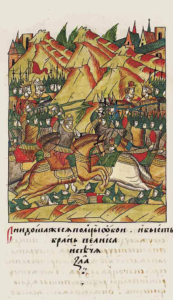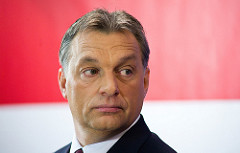Democracy always sparks discontent, but discontent can also spark change.
At a recent lecture at Christ’s College Cambridge, John Shattuck spoke about democracy and its discontents. Here, it is published in a slightly modified format, and explores the development of ‘illiberal democracy’ and explains why such a concept could never truly work in practice.

Vaclav Havel (Credit: filedump, CC BY SA 2.0)
My goal in this piece is to describe what’s happening to democracy today, especially in Eastern Europe, but also elsewhere in Europe and in the United States, and to ask questions about what may lie ahead. I will follow the wise advice of Vaclav Havel to “keep the company of those who seek the truth, but run from those who claim to have found it.” I make no such claim.
My perspective is that of an American who’s spent a dozen of the last 20 years in Central and Eastern Europe, five of them as a diplomat in the former Yugoslavia and the Czech Republic, and seven as the Rector of an international university in Budapest. You might call me a post-Cold War realist who carries hope for democracy.
Two great forces have been at work in Europe since the fall of the Berlin Wall. These competing forces are driving the politics of our time. The forces of integration have broken down longstanding barriers, promoting democratic development, creating economic interdependence and facilitating the digital revolution. Meanwhile, the forces of disintegration have created failed states like Yugoslavia in the early 1990s, making it possible for cynical political leaders to rise to power by instigating ethnic and sectarian conflict, and nationalist leaders to challenge the idea of European integration.
There are conflicting theories about how these competing forces might ultimately play out in the post-Cold War world. One is Francis Fukayama’s The End of History, which envisioned steady progress toward a universal realisation of democracy. A second is Samuel Huntington’s Clash of Civilisations, which painted the prospect of steady regress toward inevitable and continuing civilisational conflict. Over the years since they were introduced, these theories have come to symbolise competing visions of post-Cold War hope and despair, and they provide a useful starting point for my analysis of what’s happening today to democracy in Europe and the United States.
In 2014 a European Commission poll revealed that 68% of Europeans distrusted their national governments, and 82% distrusted the political parties that had produced them. In the US, a Gallup poll in the same year found that 65% of Americans were dissatisfied with their system of government and how it works – a striking increase from 21% in 2002.
The reason for this discontent may be a growing sense that the world is spinning out of control, and that democratic government may only be making things worse. A deeper reason may be that people are confused about the meaning of democracy – they are demanding both greater participation in their own governance and greater efficiency in the way government operates. So the idea of democracy is at war with itself, as people look to government to solve their problems, but are often unwilling to recognise their own responsibilities.
Digging deeper, we can find the roots of this confusion in four landmark democratic revolutions of the last fifty years. As my colleague Ivan Krastev has written, these four upheavals have simultaneously strengthened and weakened democracy in Europe and the United States.
The Cultural Revolution of the 1960s gave birth to a whole array of individual rights and freedoms, while at the same time reducing the sense of collective purpose essential to democratic governance. Rights and responsibilities became intertwined and democracy was temporarily overwhelmed by liberty.
The Market Revolution of the 1980s released the power of a market economy to produce economic growth while reducing the role of government in regulating the economy. It destroyed the “Keynesian Consensus” (forged here at Cambridge in the 1930s) about the social benefits of a mixed economy and a welfare state, and paved the way for the rise of new economic elites, increasing inequality and globalisation.
The Political Revolution of 1989 marked the end of Communism and the Cold War, the opening of borders, and the beginning of a transition to democracy and market economies in Eastern Europe. But it also marked the collapse of longstanding social support systems in the East and an end to the informal social contract in the West between elites and the people.
The most recent democratic upheaval, the Internet Revolution, opened the floodgates of information, creating unlimited opportunities for peer-to-peer communication and horizontal grassroots pressure for change. But at the same time it spawned vast echo chambers and ghettoes of communication, reducing discourse across political divides and increasing the polarisation of democratic societies.
Today’s discontent with democracy is particularly acute in Eastern Europe, where the roots of democratic governance are very shallow.

The Battle of Kosovo (Credit: Wikimedia Commons)
Eastern Europeans were ruled for centuries by successive empires of Ottoman, Russian, Hapsburg, Fascist and Communist authoritarian regimes. A long-suppressed hunger for national identity and honour among the peoples of the region constantly stirred the resentment of outside oppressors – the Hapsburgs executed the first elected Hungarian Prime Minister in 1849, Russia’s dominated Poland throughout the 19th century, and the collective memory of the Turks’ defeat of the Serbs in the Battle of Kosovo Polje at the end of the 14th century was so powerful that 600 years later Slobodan Milosevic was able to invoke it when he launched the first of his notorious campaigns against the Kosovar Muslims.
In the 20th century communism destroyed civil society in Eastern Europe, along with the sense of personal responsibility to the community that is essential to the growth of democracy. I learned in Prague in the 1990s that “volunteering” was a bad word, and in Budapest that common spaces in apartment buildings were rarely cared for by the residents. As an alternative to civil society, communism 5 provided state employment and social security, but this was dismantled by Western market economists after the fall of the Berlin Wall.
After 1989, hopes in Eastern European that democracy would bring immediate economic benefits were unfulfilled. Standards of living failed to keep pace with popular expectations, especially after the financial crisis hit the region in 2009. In this neuralgic environment Eastern Europeans found themselves attracted to political leaders who claimed they could defend them against outsiders, such as the foreign banks that had called in their mortgages when the financial markets collapsed.
The building blocks of a new nationalism were created out of these festering resentments. Two elements went into their construction.
First was the politics of national identity. The longing for national identity was generally ignored by liberal proponents of post-Cold War European integration. It was taken over by nationalist leaders who developed new narratives to appeal to a resentful and confused populace.
In Hungary, which had been on the losing side of both world wars as an ally of Germany, the new national narrative distorted history by casting Hungarians as victims, stripped of two-thirds of their lands and separated from their compatriots by the “Trianon” treaty after the First World War, then occupied by Germany and allegedly forced to participate in the Holocaust at the end of the Second War. A particularly dangerous claim in this twisted narrative is that “Brussels is the new Moscow”. After decades of being dictated to by a distant Soviet regime, Hungarians were susceptible to such a claim. Casting the European Union as a hostile foreign power served the interests of nationalist politicians like Viktor Orban whose popularity was boosted whenever EU authorities questioned the quality of Hungarian democracy.
A second building block of nationalism is the politics of fear. Central European leaders are linking the threat of terrorism to the influx of refugees fleeing the violence in the Middle East, promising to protect their countries from outsiders. In Hungary, Slovakia and Poland, the governing parties are characterising Muslim refugees as “a threat to Christian civilisation”. Not to be outdone, the Hungarian government has warned against the infiltration of refugees by terrorists, and is preparing to enact an anti-terror law to give the government emergency powers to declare “a state of terror threat” and suspend the constitution for 60 days, subject to continuous extension.
Once the nationalist state is constructed, it is given a new name.
In July 2014, Viktor Orban declared that Hungary was building an “illiberal democracy”. The Prime Minister asserted that Hungary and its Eastern European neighbors were rejecting the liberal values of individual rights, and returning to the collective values of the nation state. To emphasize his point he asserted that “the Hungarian nation is not a pile of individuals.” He claimed that liberal democracy was a failure, pointing to political division and economic inequality in the US and dysfunction in the EU on issues of financial policy and immigration. In Orban’s view, countries that are “capable of making us competitive” in the global economy “are not Western, not liberal democracies, maybe not even democracies”, citing as his models Russia, China, Turkey and Singapore.
What then are the elements of an “illiberal democracy”? The entry point is an election, to preserve the claim to be a democracy. Beyond that, the critical feature is majoritarian rule, implemented in a parliamentary system by a supermajority that guarantees total control by the ruling party. This allows the enactment of constitutional changes to eliminate checks and balances and other key distinguishing features of a pluralist liberal democracy.
The central claims of this new illiberal system are its promises of efficiency, collective purpose and national pride. The tradeoff to achieve these goals is the centralisation of power and curtailment of freedom. The question mark hanging over the system is whether it is sustainable, especially inside a larger transnational system like the European Union that is based on the values of liberal democracy. In his 2014 speech, Viktor Orban challenged the EU, claiming that “I don’t think our EU membership precludes building an illiberal new state based on a national foundation.”
By contrast, the values and structures of a liberal democratic order are intended to maximise accountability and liberty — checks and balances of power; freedoms of expression and assembly; due process of law; independence of the judiciary and the media; protection of minorities; a pluralist civil society; and the rule of law. These are the values and structures on which the European Union has been built. They are at the heart of a political culture that reflects the forces of integration in a post-Cold War Europe. But the new illiberal regimes of Eastern Europe are alien to this culture, and their neo-authoritarian leaders are rejecting it. Forces of disintegration unleashed by Viktor Orban’s challenge seem to threaten the very concept of European integration.
Last fall, the Hungarian model of illiberal democracy galvanized European nationalists when Hungary constructed razor wire fences across its borders and stationed its army and police to keep out all refugees. The result was a huge boost to the governing party’s flagging popularity at home, and the Prime Minister’s emergence on the European stage as a challenger to German Chancellor Angela Merkel whose response to the refugee crisis remained true to the liberal values of the EU. To paraphrase the Polish sociologist Zygmunt Bauman, “illiberal leaders must introduce chaos to create the opportunity for imposing order.”
A new Polish government is now emulating the Hungarian model. It made the refugee issue a central feature of its election campaign last fall, promising that religious and ethnic nationalism would protect Poles from the invasion of Muslims into Poland’s homogeneous Catholic society. The government took a page out of Orban’s playbook after the election by attacking the Constitutional Court and the independence of the Polish judiciary.
A battle is now shaping up in Europe between Liberal and Illiberal Democracy. At stake are the values that safeguard Europeans against a repeat of their catastrophic experience with 20th century fascism and communism.
Not only are these values challenged by the proponents of illiberal democracy, they are also challenged from within liberal democracies in Europe and the US. There are many worrying signs about the health of these democracies, including a steady decline in voter participation, anger at political leaders, alienation from distant decision-making, the disproportionate influence of money in politics, the inability of political leaders on both sides of the Atlantic to make decisions on urgent issues like the Eurocrisis and immigration, and growing evidence of inefficiency, polarisation and gridlock.
So this is why the winter of our discontent may not be ending any time soon. But if we step back and ask some big questions, I think we will find some surprising answers that may point toward a more favorable season for democracy.
The first big question is whether the EU will survive the challenge from Eastern Europe and the proponents of illiberal democracy.
Without major structural reforms, EU institutions are vulnerable to nationalist movements. The Brussels bureaucracy is remote, and voters have no connection to it. Only the member governments participate directly in EU governance, and they have shown little interest or inclination to discipline a member who challenges EU values, because they want to be free to do so themselves.
Paradoxically, illiberal members like Hungary benefit greatly from the EU and are therefore ultimately not a threat to its existence.
Three basic factors tie Viktor Orban to the EU: money, politics and values. The money is plentiful, and comes in the form of structural funds with few strings attached. Over the next five years Hungary is slated to receive 22 billion EUR from the EU, and many of the country’s major capital projects, public investment opportunities and employment strategies are connected to this beneficent and benign source. Despite its beneficence, the EU provides a juicy political target for Eastern European politicians who bite the hand that feeds them with their slogan that “Brussels is the new Moscow”. And despite their assault on the EU’s liberal values, Eastern European countries benefit substantially from the Schengen rules that provide employment mobility for their citizens.
So the EU is likely to survive the challenge from the East. A far greater challenge, however, is coming not from the new illiberal democracies, but from one of the world’s oldest liberal democracies in the West, right here in the UK. Now that the EU has given Prime Minister David Cameron what he was asking for, it would be devastating for both sides if the Brexit referendum were to the UK’s departure from the EU.
My second big question is whether illiberal democracy in Eastern Europe is sustainable.
If an illiberal government can be changed by democratic means, then paradoxically the system may have resilience. But if the centralization of power has been so successful that the government is able to fend off a democratic challenge, then the system may not be sustainable in the long run.

Europa Pont, CC BY 2.0
There are four key weaknesses in the system. First, the legacy of state control over the economy and its eventual collapse under communism shows that it is difficult for centralised regimes to deliver economically to their citizens without liberalising their political institutions. This is particularly true for a small country like Hungary — or even a large one like Poland — that have been incorporated into an interconnected continental market like the EU. Russia and China, the two main countries cited by Viktor Orban as models of illiberal governance, are both faltering economically.
Second, illiberal governance leads to systemic corruption, which is a source of political instability and a drag on economic growth. Eastern European countries have unfavourable ratings compared to other EU members on Transparency International’s European Corruption Index.
Third, illiberal governance is vulnerable to the digital revolution, which allows increased peer-to-peer flows of information and horizontal pressures for change. Although traditional media may have fallen under the control of illiberal regimes, digital media have not. In Hungary, over 100,000 people demonstrated in 2014 when the government threatened to tax the use of the internet, and the government had to back down.
Fourth, as the internet tax controversy showed, illiberal regimes have few safety valves for citizen discontent. When popular pressures build, the regime must either back down or resort to coercion, which as the recent example of Ukraine shows, is likely to lead to even greater public discontent.
A third big question is whether liberal democracy is in recession, or in permanent decline?
The answer to this question depends on the perspective of the person asking it.
If one looks at increasing popular demands for participation in governance and engagement in decision-making – as demonstrated by democracy movements around the world from Euromaidan to Taksim Park to Tahrir Square to Hong Kong to Black Lives Matter in the US – these ideas of democracy have greater appeal than ever, even as the supply of healthy democracy may be diminishing.
But if one looks at the popular appeal of the politics of national identity and security, and the demand for stability and efficiency in governance, as the opinion polls in Europe and the US seem to show, then liberal democracy with its ageing pluralist institutions and short-term election perspectives may be in decline.
It will all depend on the capacity of liberal democracy to reform itself – to use the tools of the digital revolution to strengthen participation while levelling the playing field and curtailing the economic power of the top 1% to exercise disproportionate influence over decision-making. It will also depend on liberal democracy giving stronger recognition to national identity and security, and creating channels for national citizen participation in supranational structures like the EU.
My final question is about what’s going on the United States. Will the US elect a nationalist, populist, unilateralist, illiberal president?
There are certainly threats to liberal values in the US from the far right, on immigration, racial issues, and women’s rights, to name a few. But there’s also plenty of energy, especially on the left, for economic and political reforms that would strengthen liberal democracy. On foreign policy, no one should mistake populist discontent for support for foreign intervention. US military deployment is very unpopular in the wake of the disastrous intervention in Iraq. If anything, I’m concerned that the US will be swept by a wave of neo-isolationism that may keep it from engaging as a leader in the world, and particularly from working with Europe and Russia to resolve the crises in Ukraine and Syria, and manage the global refugee crisis. My prediction is that the US will NOT elect a nationalist, populist, unilateralist, illiberal president, but that gridlock and polarisation will continue to plague American politics unless one party wins both the presidency and the Congress, especially now that the Supreme is up for grabs.
I promised at the outset not to claim to have found any special truth about the state of democracy in Europe and the US. But let me offer a short concluding summary of the situation I’ve been describing.
There is no doubt that the problems facing new democracies in Eastern Europe are deeply rooted in the long legacy of authoritarianism, and solutions must come from within and take time to develop. These countries do not pose an existential threat to the European Union – in fact, what the EU provides makes them grudging but strong supporters.
Illiberal democracies stimulate and feed on popular fears and anxieties, but without institutional safety valves for popular discontent, they may not be sustainable. The popular demand for participation is growing, but it needs new language and new structures beyond those of traditional liberal democracy.
Democracy always sparks discontent. But discontent can also spark change. Democracy offers a path for change but illiberal governance does not because its proponents are determined to control all the levers of power, and block all the avenues for change. In the end, democracy as Winston Churchill famously pointed out, is the worst form of government, apart from all the others.
Finally, Vaclav Havel sums up my view about democracy and its discontents:
“I’m not an optimist because I don’t believe all ends well. I’m not a pessimist because I don’t believe all ends badly. Instead, I’m a realist who carries hope, and hope is the belief that democracy has meaning, and is worth the struggle.”
—
Note: this post is a modified version of an address given by the author at Christ’s College Cambridge and is reposted with the permission of both the college and the speaker/author. It does not represent the views of Democratic Audit or the LSE. Please read our comments policy before posting.
—
 John Shattuck is the President of the Central European University
John Shattuck is the President of the Central European University





 Democratic Audit's core funding is provided by the Joseph Rowntree Charitable Trust. Additional funding is provided by the London School of Economics.
Democratic Audit's core funding is provided by the Joseph Rowntree Charitable Trust. Additional funding is provided by the London School of Economics.
Democracy always sparks discontent, but discontent can also spark change https://t.co/JM2heXJfkE
Democracy always sparks discontent, but discontent can also spark change https://t.co/gYXiKFBx1a
Democracy always sparks discontent, but discontent can also spark change. See @democraticaudit interesting article: https://t.co/aQPHYu140j
Democracy always sparks discontent, but discontent can also spark change. https://t.co/vbVKfAaFEF
Idea of #democracy “is at war with itself”: people demand both greater participation and more government efficiency https://t.co/YPDDaiC6GH
Important read! // Democracy always sparks discontent, but discontent can also spark change – https://t.co/CsrVMny5Gz
Retweeted Democratic Audit UK (@democraticaudit):
Democracy always sparks discontent, but discontent can also… https://t.co/0iME8TFIu3
Democracy always sparks discontent, but discontent can also spark change https://t.co/aSiCaVX8If
J Shattuck explores the development of ‘illiberal democracy’ and explains why such a concept could never truly work: https://t.co/6hnFezIz52
Democracy always sparks discontent, but discontent can also spark change. https://t.co/eHwcc3Evp0
Democracy always sparks discontent, but discontent can also spark change. https://t.co/TQCntFmJj1
#Egypt Democracy always sparks discontent, but discontent can also spark change. – Democr… https://t.co/FbadBloGhf #Tahrir #ArabSpring
Democracy always sparks discontent, but discontent can also spark change. https://t.co/kUhHdL8GEo https://t.co/ImULPVtbkU